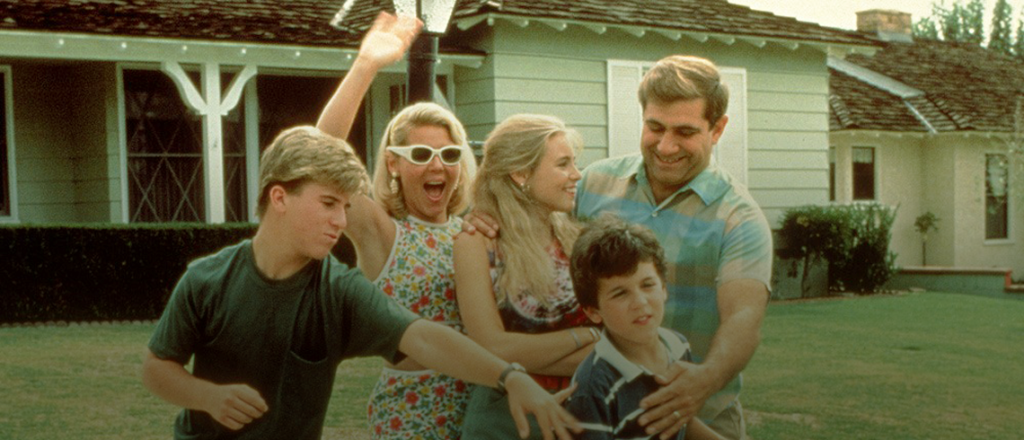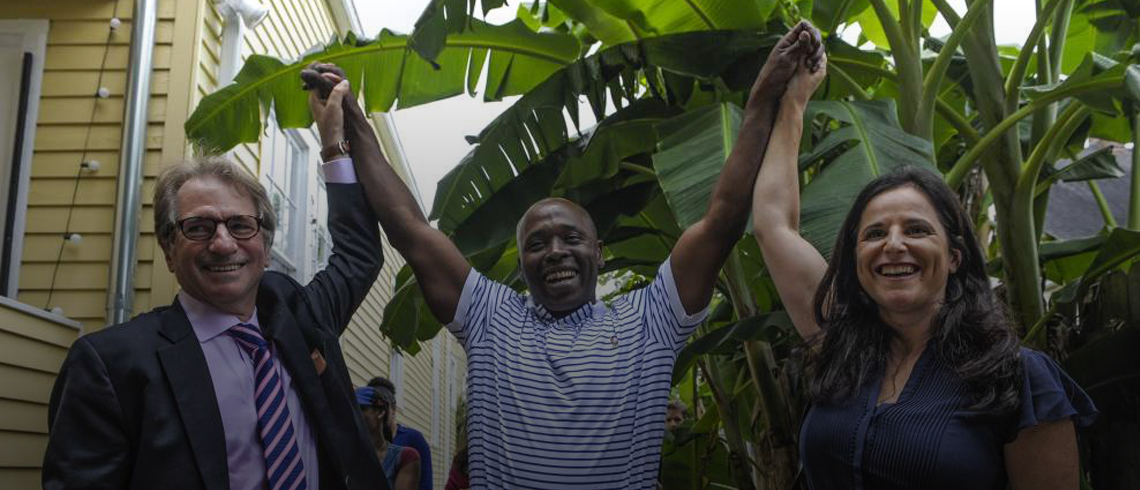Photos of Nathan by Veronica Dominach | dominachphotography.com. Above: Nathan Brown with attorneys from the Innocence Project, Barry Scheck (left) and Vanessa Potkin (right). Below: Nathan Brown is welcomed by his daughter, Celine Brown, and his grandson, Kenard Jr.
In our daily lives, we often accept that our memories are poor, and eventually move on if our memories don’t exactly match up with another person’s. We often agree to disagree, but that’s not an option in court. And yet memory is as fragile and poor there as it is when we’re struggling to remember where we did have that second date. In “Court of Memory,” our host speaks with Nathan Brown, an exoneree, Karen Newirth, a Senior Staff Attorney from the Innocence Project, and Julia Shaw, author of The Memory Illusion, as he explores the high stakes of remembering in the criminal justice system.
 Nathan Brown was exonerated on June 25th, 2014 after serving nearly 17 years for an attempted rape that he did not commit. Brown was 23 years old when he was convicted, and was eventually exonerated on the basis of DNA evidence. His conviction depended upon an eyewitness identification known as a “show-up,” where the suspect is presented to the victim shortly after the crime and, in Nathan’s case, at the scene of the crime. As the Innocence Project reports, “in eyewitness identifications, witness memory is impacted by a variety of factors that occur from the time of the crime onwards, and their memories can be easily contaminated. Scientific studies (particularly in the last three decades) have affirmed that eyewitness identification is often inaccurate and that it can be made more accurate by implementing specific identification reforms that prevent memory contamination.”
Nathan Brown was exonerated on June 25th, 2014 after serving nearly 17 years for an attempted rape that he did not commit. Brown was 23 years old when he was convicted, and was eventually exonerated on the basis of DNA evidence. His conviction depended upon an eyewitness identification known as a “show-up,” where the suspect is presented to the victim shortly after the crime and, in Nathan’s case, at the scene of the crime. As the Innocence Project reports, “in eyewitness identifications, witness memory is impacted by a variety of factors that occur from the time of the crime onwards, and their memories can be easily contaminated. Scientific studies (particularly in the last three decades) have affirmed that eyewitness identification is often inaccurate and that it can be made more accurate by implementing specific identification reforms that prevent memory contamination.”
Karen Newirth is the senior staff attorney in the Innocence Project’s strategic litigation unit, where she focuses on the Innocence Project’s law reform efforts around eyewitness identification. As she points out in the episode, a witness’s memory can easily be contaminated by certain procedures, and by neglecting memory science, the courts risk convicting innocent people and retraumatizing victims who face with the consequences of their memory contamination: “When I think about the role of the memory expert in an eyewitness case what I think their greatest utility is Is giving the jury a framework for understanding that the testimony they’ve heard from the eyewitness is a story that the witness has put together based in part on his or her memory but also based on all of this other stuff that has come in in a neutral way, or maybe in a malicious way, or maybe in somebody’s attempt to help the witness, but that has come in from all all these different sources and have created this mosaic that the jury needs to sort out and weigh and maybe put to the side if they conclude that there’s just not enough reason to believe that the witness could actually have seen or remembered all of the things that she or he claims to.”
 Dr. Julia Shaw’s study “Constructing Rich False Memories of Committing Crime,” reveals our susceptibility to adopt false memories when led to recount a story that didn’t occur, even when the story is a crime we committed. The Innocence Project reports that “more than 1 out of 4 people wrongfully convicted but later exonerated by DNA evidence made a false confession or incriminating statement.” Dr. Shaw’s study shows us how one might admit to a crime they didn’t commit, how easily fact and fiction can become blurred in our remembering.
Dr. Julia Shaw’s study “Constructing Rich False Memories of Committing Crime,” reveals our susceptibility to adopt false memories when led to recount a story that didn’t occur, even when the story is a crime we committed. The Innocence Project reports that “more than 1 out of 4 people wrongfully convicted but later exonerated by DNA evidence made a false confession or incriminating statement.” Dr. Shaw’s study shows us how one might admit to a crime they didn’t commit, how easily fact and fiction can become blurred in our remembering.
SUBSCRIBE: iTunes | Google Play | Stitcher | SoundCloud | RSS



 Nathan Brown was exonerated on June 25th, 2014 after serving nearly 17 years for an attempted rape that he did not commit. Brown was 23 years old when he was convicted, and was eventually exonerated on the basis of DNA evidence. His conviction depended upon an eyewitness identification known as a “show-up,” where the suspect is presented to the victim shortly after the crime and, in Nathan’s case, at the scene of the crime. As the Innocence Project reports, “in eyewitness identifications, witness memory is impacted by a variety of factors that occur from the time of the crime onwards, and their memories can be easily contaminated. Scientific studies (particularly in the last three decades) have affirmed that eyewitness identification is often inaccurate and that it can be made more accurate by implementing specific identification reforms that prevent memory contamination.”
Nathan Brown was exonerated on June 25th, 2014 after serving nearly 17 years for an attempted rape that he did not commit. Brown was 23 years old when he was convicted, and was eventually exonerated on the basis of DNA evidence. His conviction depended upon an eyewitness identification known as a “show-up,” where the suspect is presented to the victim shortly after the crime and, in Nathan’s case, at the scene of the crime. As the Innocence Project reports, “in eyewitness identifications, witness memory is impacted by a variety of factors that occur from the time of the crime onwards, and their memories can be easily contaminated. Scientific studies (particularly in the last three decades) have affirmed that eyewitness identification is often inaccurate and that it can be made more accurate by implementing specific identification reforms that prevent memory contamination.” Dr. Julia Shaw’s study “Constructing Rich False Memories of Committing Crime,” reveals our susceptibility to adopt false memories when led to recount a story that didn’t occur, even when the story is a crime we committed. The Innocence Project reports that “more than 1 out of 4 people wrongfully convicted but later exonerated by DNA evidence made a false confession or incriminating statement.” Dr. Shaw’s study shows us how one might admit to a crime they didn’t commit, how easily fact and fiction can become blurred in our remembering.
Dr. Julia Shaw’s study “Constructing Rich False Memories of Committing Crime,” reveals our susceptibility to adopt false memories when led to recount a story that didn’t occur, even when the story is a crime we committed. The Innocence Project reports that “more than 1 out of 4 people wrongfully convicted but later exonerated by DNA evidence made a false confession or incriminating statement.” Dr. Shaw’s study shows us how one might admit to a crime they didn’t commit, how easily fact and fiction can become blurred in our remembering.